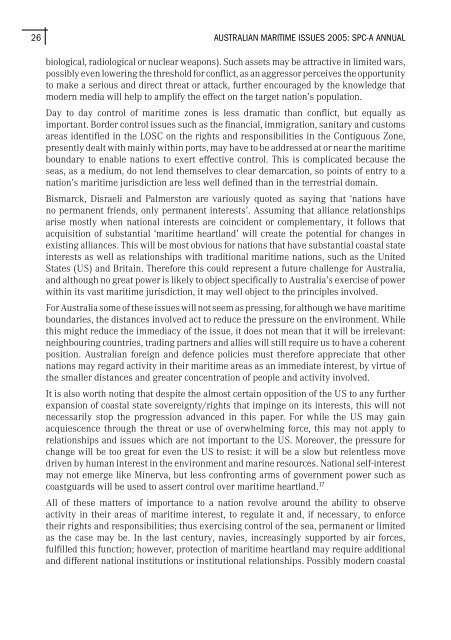Australian Maritime Issues 2005 - Royal Australian Navy
Australian Maritime Issues 2005 - Royal Australian Navy
Australian Maritime Issues 2005 - Royal Australian Navy
Create successful ePaper yourself
Turn your PDF publications into a flip-book with our unique Google optimized e-Paper software.
26<br />
AUSTRALIAN MARITIME ISSUES <strong>2005</strong>: SPC-A ANNUAL<br />
biological, radiological or nuclear weapons). Such assets may be attractive in limited wars,<br />
possibly even lowering the threshold for conflict, as an aggressor perceives the opportunity<br />
to make a serious and direct threat or attack, further encouraged by the knowledge that<br />
modern media will help to amplify the effect on the target nation’s population.<br />
Day to day control of maritime zones is less dramatic than conflict, but equally as<br />
important. Border control issues such as the financial, immigration, sanitary and customs<br />
areas identified in the LOSC on the rights and responsibilities in the Contiguous Zone,<br />
presently dealt with mainly within ports, may have to be addressed at or near the maritime<br />
boundary to enable nations to exert effective control. This is complicated because the<br />
seas, as a medium, do not lend themselves to clear demarcation, so points of entry to a<br />
nation’s maritime jurisdiction are less well defined than in the terrestrial domain.<br />
Bismarck, Disraeli and Palmerston are variously quoted as saying that ‘nations have<br />
no permanent friends, only permanent interests’. Assuming that alliance relationships<br />
arise mostly when national interests are coincident or complementary, it follows that<br />
acquisition of substantial ‘maritime heartland’ will create the potential for changes in<br />
existing alliances. This will be most obvious for nations that have substantial coastal state<br />
interests as well as relationships with traditional maritime nations, such as the United<br />
States (US) and Britain. Therefore this could represent a future challenge for Australia,<br />
and although no great power is likely to object specifically to Australia’s exercise of power<br />
within its vast maritime jurisdiction, it may well object to the principles involved.<br />
For Australia some of these issues will not seem as pressing, for although we have maritime<br />
boundaries, the distances involved act to reduce the pressure on the environment. While<br />
this might reduce the immediacy of the issue, it does not mean that it will be irrelevant:<br />
neighbouring countries, trading partners and allies will still require us to have a coherent<br />
position. <strong>Australian</strong> foreign and defence policies must therefore appreciate that other<br />
nations may regard activity in their maritime areas as an immediate interest, by virtue of<br />
the smaller distances and greater concentration of people and activity involved.<br />
It is also worth noting that despite the almost certain opposition of the US to any further<br />
expansion of coastal state sovereignty/rights that impinge on its interests, this will not<br />
necessarily stop the progression advanced in this paper. For while the US may gain<br />
acquiescence through the threat or use of overwhelming force, this may not apply to<br />
relationships and issues which are not important to the US. Moreover, the pressure for<br />
change will be too great for even the US to resist: it will be a slow but relentless move<br />
driven by human interest in the environment and marine resources. National self-interest<br />
may not emerge like Minerva, but less confronting arms of government power such as<br />
coastguards will be used to assert control over maritime heartland. 17<br />
All of these matters of importance to a nation revolve around the ability to observe<br />
activity in their areas of maritime interest, to regulate it and, if necessary, to enforce<br />
their rights and responsibilities; thus exercising control of the sea, permanent or limited<br />
as the case may be. In the last century, navies, increasingly supported by air forces,<br />
fulfilled this function; however, protection of maritime heartland may require additional<br />
and different national institutions or institutional relationships. Possibly modern coastal

















